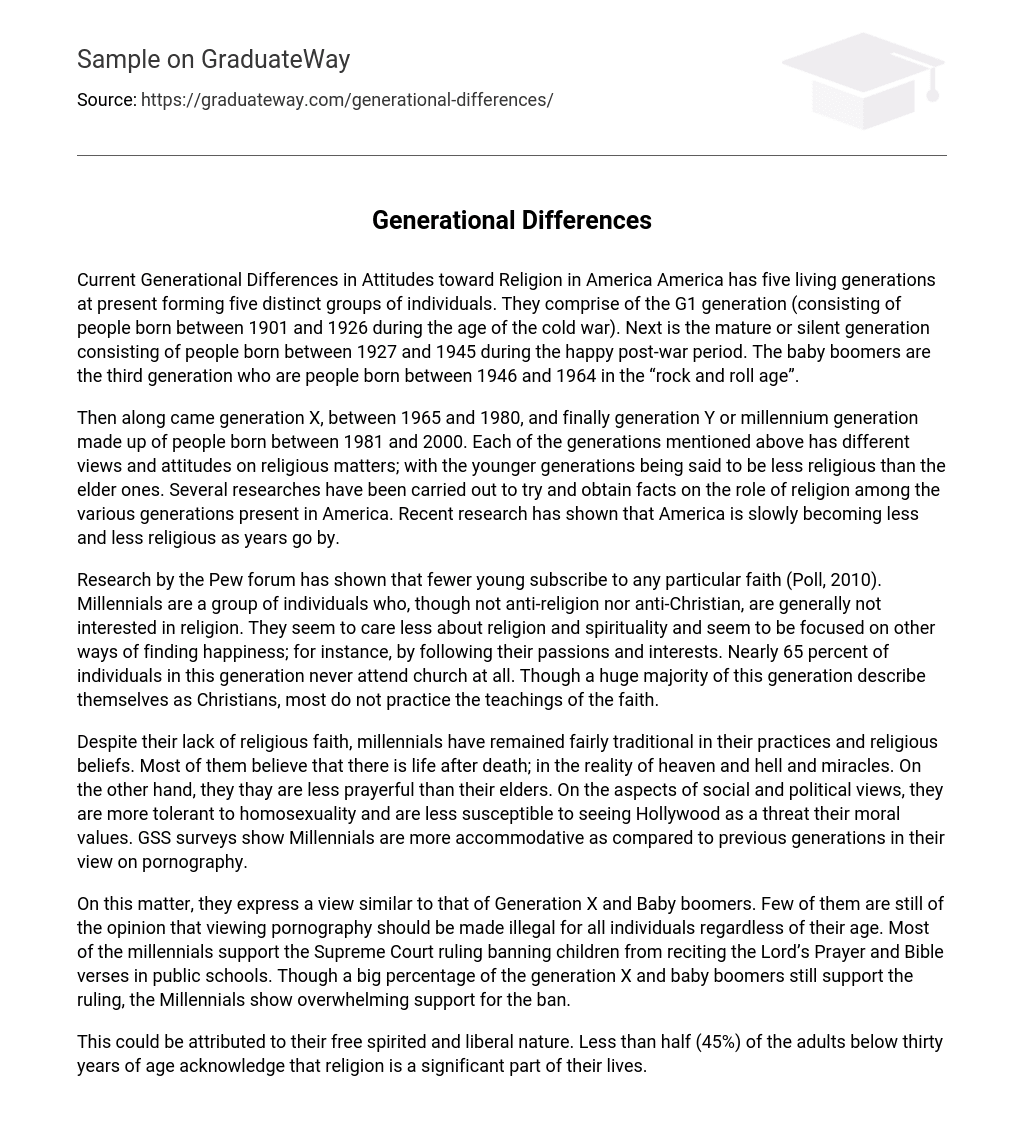Current Generational Differences in Attitudes toward Religion in America America has five living generations at present forming five distinct groups of individuals. They comprise of the G1 generation (consisting of people born between 1901 and 1926 during the age of the cold war). Next is the mature or silent generation consisting of people born between 1927 and 1945 during the happy post-war period. The baby boomers are the third generation who are people born between 1946 and 1964 in the “rock and roll age”.
Then along came generation X, between 1965 and 1980, and finally generation Y or millennium generation made up of people born between 1981 and 2000. Each of the generations mentioned above has different views and attitudes on religious matters; with the younger generations being said to be less religious than the elder ones. Several researches have been carried out to try and obtain facts on the role of religion among the various generations present in America. Recent research has shown that America is slowly becoming less and less religious as years go by.
Research by the Pew forum has shown that fewer young subscribe to any particular faith (Poll, 2010). Millennials are a group of individuals who, though not anti-religion nor anti-Christian, are generally not interested in religion. They seem to care less about religion and spirituality and seem to be focused on other ways of finding happiness; for instance, by following their passions and interests. Nearly 65 percent of individuals in this generation never attend church at all. Though a huge majority of this generation describe themselves as Christians, most do not practice the teachings of the faith.
Despite their lack of religious faith, millennials have remained fairly traditional in their practices and religious beliefs. Most of them believe that there is life after death; in the reality of heaven and hell and miracles. On the other hand, they thay are less prayerful than their elders. On the aspects of social and political views, they are more tolerant to homosexuality and are less susceptible to seeing Hollywood as a threat their moral values. GSS surveys show Millennials are more accommodative as compared to previous generations in their view on pornography.
On this matter, they express a view similar to that of Generation X and Baby boomers. Few of them are still of the opinion that viewing pornography should be made illegal for all individuals regardless of their age. Most of the millennials support the Supreme Court ruling banning children from reciting the Lord’s Prayer and Bible verses in public schools. Though a big percentage of the generation X and baby boomers still support the ruling, the Millennials show overwhelming support for the ban.
This could be attributed to their free spirited and liberal nature. Less than half (45%) of the adults below thirty years of age acknowledge that religion is a significant part of their lives. This is as compared to 59% between ages 50 and 64 and 64% among those older than 65. This shows that the young show lower levels of religious inclination than their elders. A similar survey by Gallup confirmed these findings, further affirming that religion is somehow less important for millennials today than it was for the members of Generation X .
Similarly, fewer of the young adults believe in God’s existence than the elder generations. 6% of the young adults today say they are sure that God exists. This is low if compared with 73% of those aged 30 and older. GSS data show that Millennial’s belief in God is similar to the results observed among Generation X. However, the percentage of religious individuals among Generation X and Baby boomers has been constantly increasing over the decades.
Another difference in the role of religion can be seen in the views held about the Bible by the different generations. While older generations strictly accepted the Bible as the literal word of God, the young are generally less inclined to this fact. On this issue, beliefs held by the Millennials closely resemble those of Generation X. In 2008 GSS survey, approximately a quarter (27%) of millenials held the belief that the Bible as the literal word of God compared with 28% among Generation X. The Baby boomers were slightly higher at 33%.
Those among the young who at least professed a religion have a higher tendency to view their own religion as the one and only true religion, than their elders. Roughly 29% of religiously affiliated adults under the age of thirty say that their religion is the one and only true faith. This is as compared to the 23% of those over thirty years holding the same view. It is interesting that though more young Americans believe that their faith as the one and only way to salvation, young adults are also more open to the idea that their religion could be interpreted in many different ways.
Approximately 74% of religiously affiliated adults are of the view that there are many ways to interpret the teachings of their faith (Poll, 2010). It is evident that there are differences on the view of religion based on the individual’s generations. The way of thinking is affected by one’s generation and the generation’s generalization on the issue of religion. Identifying one’s generation helps one understand the reason for their interpretations of religion.





